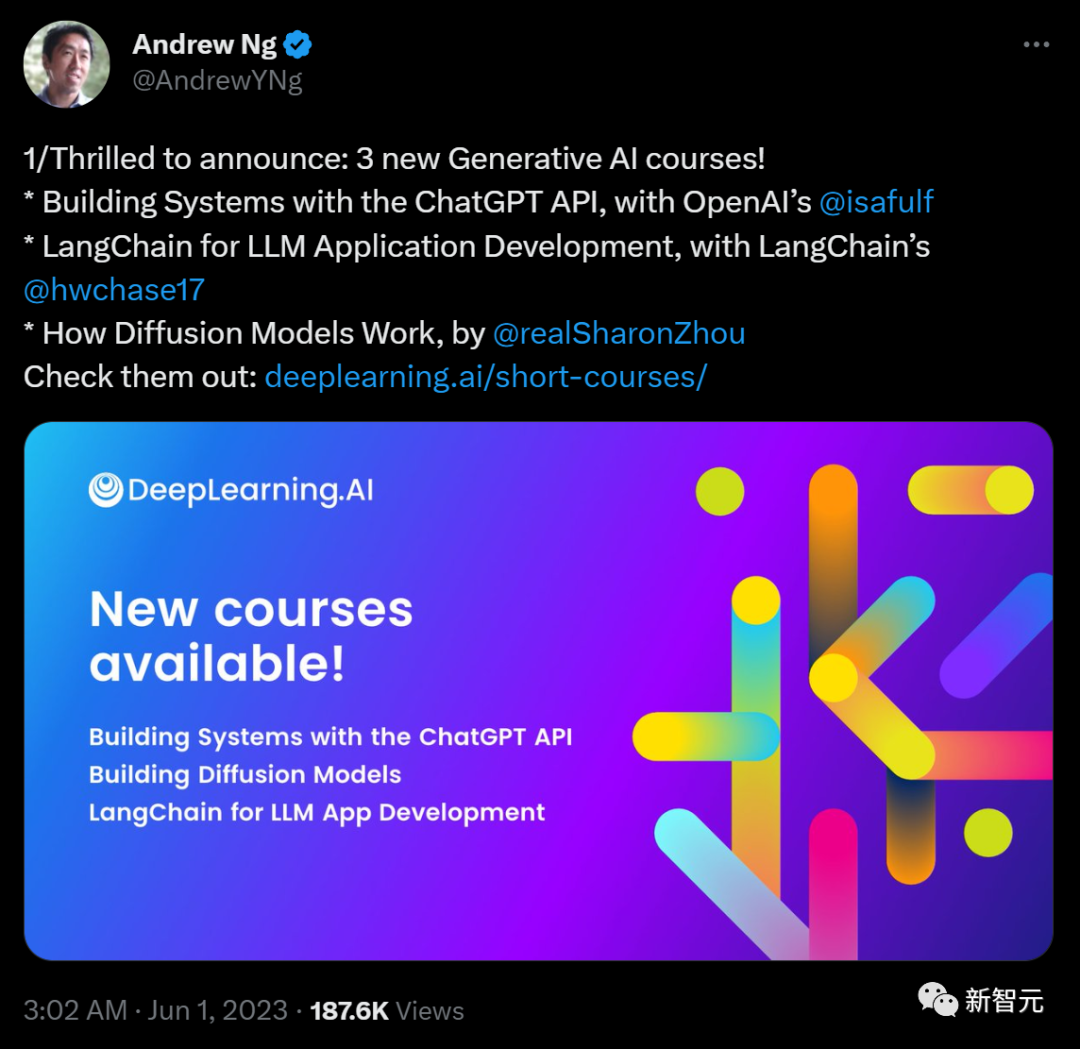 Technology peripherals
Technology peripherals
 AI
AI
 Andrew Ng's three new courses are released in a row, teaching you step by step how to build applications using ChatGPT API
Andrew Ng's three new courses are released in a row, teaching you step by step how to build applications using ChatGPT API
Andrew Ng's three new courses are released in a row, teaching you step by step how to build applications using ChatGPT API
Ng Enda has sent good news to the AI community again.
Today, Andrew Ng announced on Twitter that three new generative AI courses are online.

These three courses include——
1. Using OpenAI ChatGPT API Building System: With this course, go beyond a single prompt and learn to build complex applications that use multiple API calls to LLM. At the same time, you will learn how to evaluate the output of LLM to ensure safety and accuracy, and drive iterative improvements.

2. LangChain for LLM application development: By learning this powerful open source tool, you can build applications that use LLM Applications include chatbot memory, question answering on documents, and LLM agents that can decide what actions to take next.

3. How the diffusion model works: This course allows you to learn how the diffusion model Technical details, these models support Midjourney, DALL·E 2 and Stable Diffusion. You can also generate your own working Jupyter code for video game sprites.

Note that these courses are free for a limited time, and the duration of each course is 1- 1.5 hours.
Building a system using ChatGPT API
In this course, you can learn how to automate complex workflows by continuously calling large language models.

Contains:
· Constructing prompts that interact with previous prompts chain.
· Build Python code to interact with existing and new prompt systems.
· Build a customer service chatbot using the techniques in the course.
These skills can be applied to real-world scenarios including classifying user queries into chat agent responses, assessing the security of user queries, and processing tasks for thought chaining, multi-step reasoning.
Among them, hands-on examples make concepts easy to understand, while built-in Jupyter Notebooks let you seamlessly experiment with code and labs introduced in the course.
This course is suitable for beginners who have a basic understanding of Python. It is also suitable for intermediate and advanced machine learning engineers who want to learn LLM's cutting-edge rapid engineering skills.
LangChain for LLM application development
In this course, you can learn the basic skills to use the LangChain framework to extend the use cases and functionality of language models in application development. .
Specifically includes:
· Model, prompts and parser: calling LLM, providing prompts and parsing responses
· LLM's memory: memory for storing dialogue and managing limited context space
· Chains: creating sequences of operations
· Documentation Q&A: Apply LLM to your proprietary data and use case requirements
· Agents: Exploring the Powerful Development of LLMs as Inference Agents
At the end of the course, you will have a model that can serve as a starting point for your own exploration of applied diffusion models .
This course will greatly help you expand the possibilities of leveraging powerful language models, and in a few hours, you can create incredible applications.
This course is suitable for beginners who need to master basic Python knowledge.
How Diffusion Models Work
In this section, you can gain an in-depth understanding of the diffusion process and the models that perform it.

This class goes beyond simply bringing in a pre-built model or using an API, it teaches you to start from scratch Construct a diffusion model.
Specifically includes:
· Explore the cutting-edge world of diffusion-based generative AI and create your own diffusion model from scratch.
· Gain insights into diffusion processes and the models that drive them, going beyond pre-built models and APIs.
· Gain practical coding skills through labs sampling, training diffusion models, building neural networks for noise prediction, and adding context to personalized image generation.
By the end of the course, you will have a model that can serve as a starting point for your own exploration of applying diffusion models.
Among them, hands-on examples make concepts easy to understand, while built-in Jupyter Notebooks let you seamlessly experiment with code and labs introduced in the course.
This is an intermediate-level course that requires knowledge of Python, Tensorflow, or Pytorch.
The above is the detailed content of Andrew Ng's three new courses are released in a row, teaching you step by step how to build applications using ChatGPT API. For more information, please follow other related articles on the PHP Chinese website!

Hot AI Tools

Undresser.AI Undress
AI-powered app for creating realistic nude photos

AI Clothes Remover
Online AI tool for removing clothes from photos.

Undress AI Tool
Undress images for free

Clothoff.io
AI clothes remover

Video Face Swap
Swap faces in any video effortlessly with our completely free AI face swap tool!

Hot Article

Hot Tools

Notepad++7.3.1
Easy-to-use and free code editor

SublimeText3 Chinese version
Chinese version, very easy to use

Zend Studio 13.0.1
Powerful PHP integrated development environment

Dreamweaver CS6
Visual web development tools

SublimeText3 Mac version
God-level code editing software (SublimeText3)

Hot Topics
 1655
1655
 14
14
 1413
1413
 52
52
 1306
1306
 25
25
 1252
1252
 29
29
 1226
1226
 24
24
 How much is Bitcoin worth
Apr 28, 2025 pm 07:42 PM
How much is Bitcoin worth
Apr 28, 2025 pm 07:42 PM
Bitcoin’s price ranges from $20,000 to $30,000. 1. Bitcoin’s price has fluctuated dramatically since 2009, reaching nearly $20,000 in 2017 and nearly $60,000 in 2021. 2. Prices are affected by factors such as market demand, supply, and macroeconomic environment. 3. Get real-time prices through exchanges, mobile apps and websites. 4. Bitcoin price is highly volatile, driven by market sentiment and external factors. 5. It has a certain relationship with traditional financial markets and is affected by global stock markets, the strength of the US dollar, etc. 6. The long-term trend is bullish, but risks need to be assessed with caution.
 Which of the top ten currency trading platforms in the world are the latest version of the top ten currency trading platforms
Apr 28, 2025 pm 08:09 PM
Which of the top ten currency trading platforms in the world are the latest version of the top ten currency trading platforms
Apr 28, 2025 pm 08:09 PM
The top ten cryptocurrency trading platforms in the world include Binance, OKX, Gate.io, Coinbase, Kraken, Huobi Global, Bitfinex, Bittrex, KuCoin and Poloniex, all of which provide a variety of trading methods and powerful security measures.
 What are the top ten virtual currency trading apps? The latest digital currency exchange rankings
Apr 28, 2025 pm 08:03 PM
What are the top ten virtual currency trading apps? The latest digital currency exchange rankings
Apr 28, 2025 pm 08:03 PM
The top ten digital currency exchanges such as Binance, OKX, gate.io have improved their systems, efficient diversified transactions and strict security measures.
 Recommended reliable digital currency trading platforms. Top 10 digital currency exchanges in the world. 2025
Apr 28, 2025 pm 04:30 PM
Recommended reliable digital currency trading platforms. Top 10 digital currency exchanges in the world. 2025
Apr 28, 2025 pm 04:30 PM
Recommended reliable digital currency trading platforms: 1. OKX, 2. Binance, 3. Coinbase, 4. Kraken, 5. Huobi, 6. KuCoin, 7. Bitfinex, 8. Gemini, 9. Bitstamp, 10. Poloniex, these platforms are known for their security, user experience and diverse functions, suitable for users at different levels of digital currency transactions
 Which of the top ten currency trading platforms in the world are among the top ten currency trading platforms in 2025
Apr 28, 2025 pm 08:12 PM
Which of the top ten currency trading platforms in the world are among the top ten currency trading platforms in 2025
Apr 28, 2025 pm 08:12 PM
The top ten cryptocurrency exchanges in the world in 2025 include Binance, OKX, Gate.io, Coinbase, Kraken, Huobi, Bitfinex, KuCoin, Bittrex and Poloniex, all of which are known for their high trading volume and security.
 Decryption Gate.io Strategy Upgrade: How to Redefine Crypto Asset Management in MeMebox 2.0?
Apr 28, 2025 pm 03:33 PM
Decryption Gate.io Strategy Upgrade: How to Redefine Crypto Asset Management in MeMebox 2.0?
Apr 28, 2025 pm 03:33 PM
MeMebox 2.0 redefines crypto asset management through innovative architecture and performance breakthroughs. 1) It solves three major pain points: asset silos, income decay and paradox of security and convenience. 2) Through intelligent asset hubs, dynamic risk management and return enhancement engines, cross-chain transfer speed, average yield rate and security incident response speed are improved. 3) Provide users with asset visualization, policy automation and governance integration, realizing user value reconstruction. 4) Through ecological collaboration and compliance innovation, the overall effectiveness of the platform has been enhanced. 5) In the future, smart contract insurance pools, forecast market integration and AI-driven asset allocation will be launched to continue to lead the development of the industry.
 What are the top currency trading platforms? The top 10 latest virtual currency exchanges
Apr 28, 2025 pm 08:06 PM
What are the top currency trading platforms? The top 10 latest virtual currency exchanges
Apr 28, 2025 pm 08:06 PM
Currently ranked among the top ten virtual currency exchanges: 1. Binance, 2. OKX, 3. Gate.io, 4. Coin library, 5. Siren, 6. Huobi Global Station, 7. Bybit, 8. Kucoin, 9. Bitcoin, 10. bit stamp.
 How to measure thread performance in C?
Apr 28, 2025 pm 10:21 PM
How to measure thread performance in C?
Apr 28, 2025 pm 10:21 PM
Measuring thread performance in C can use the timing tools, performance analysis tools, and custom timers in the standard library. 1. Use the library to measure execution time. 2. Use gprof for performance analysis. The steps include adding the -pg option during compilation, running the program to generate a gmon.out file, and generating a performance report. 3. Use Valgrind's Callgrind module to perform more detailed analysis. The steps include running the program to generate the callgrind.out file and viewing the results using kcachegrind. 4. Custom timers can flexibly measure the execution time of a specific code segment. These methods help to fully understand thread performance and optimize code.



